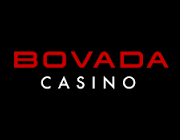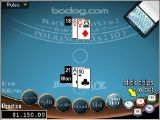How to calculate the house edge
Last update: August 2019
In a separate article we saw how the house edge is the casino's average profit per bet, in percentage terms. In this article we'll see how to calculate it. The main point is to see that when you win, the casino always pays you less than true odds. That's their built-in advantage over you, and why you can never be a long-term winner.
We'll start with coin flips, because they're easy to understand. We'll bet $1 on the flip of a coin, winning on heads and losing on tails. Here's how that looks:
| Fair Coin Flip Game | |||
| Event | Odds | Payout | Return |
| Win | 50% | $1 | +$0.50 |
| Lose | 50% | -$1 | -$0.50 |
| Player loss: | $0 | ||
| House edge: |
0% |
||
There's no advantage to the casino in this game, which is why you'd never see this game in a casino. So let's casino-ize it: In this version, you get paid only 90¢ when you win:
| Casino Coin Flip Game | |||
| Event | Odds | Payout | Return |
| Win | 50% | $0.90 | +$0.45 |
| Lose | 50% | -$1 | -$0.50 |
| Player loss (casino profit) | -$0.05 | ||
| House edge ($0.05 ÷ $1) |
5% |
||
Ta-da, house edge for the casino of 5%. If you thought it should be 10%, remember, the 10¢ penalty kicks in only when you win, which is half of the flips.
Casino games are all based on the same principle, paying you less than the true odds of winning. The games are just more complicated than our coin flip game, both to make them more interesting, and to make it less obvious that the odds are stacked against you. Sure, we know the games are stacked against us, but if you can't easily see the inequality then you're more likely to play. After all, how attractive did the 90¢ coin flip game seem to you? Probably almost no one would play such a game. But they'll play casino games, even though they're based on the exact same concept.
Let's look at the house edge in
roulette. There are 18 reds, 18 blacks, and two
greens. So if you bet on red, you have an 18/38 chance of
winning. If the casino were paying fair odds, they'd pay you
the inverse, or 38/18, minus 1 (1 representing your bet, which you
get back). So, a fair payout on a winning bet would be
| Fair Roulette Game | |||
| Event | Odds | Payout | Return |
| Win | 18/38 (0.4737) | $20 | +$9.47 |
| Lose | 20/38 (0.5263) | -$18 | -$9.47 |
| Player loss (casino profit) | $0.00 | ||
| House Edge | 0% | ||
But, of course, the casino won't pay you fair odds. Instead of paying you 20/18 on your win, they pay you only even money. Let's see how that looks:
| Casino Roulette Game | |||
| Event | Odds | Payout | Return |
| Win | 18/38 (0.4737) | $18 | +$8.53 |
| Lose | 20/38 (0.5263) | -$18 | -$9.47 |
| Player loss (casino profit) | -$0.94 | ||
| House Edge ($0.94÷$18) |
5.2% |
||
Now let's look at a bet that you're likely to win. Let's say you bet on two columns in roulette, or 24 numbers. Your odds of winning this bet are pretty good, 24/38 = 63.2%. If the casino were paying fair odds, they'd pay you the inverse, or 38/24, minus 1 (1 representing your bet, which you get back). For this example, we're gonna up our bet to $100 to make the house edge percentage easier to see.
| Fair Roulette 2-column bet | |||
| Event | Odds | Payout | Return |
| Win | 24/38 (63.157%) | $100 x (38/24 -1) = $58.33 |
+$36.84 |
| Lose | 14/38 (36.843%) | -$100 | -$36.84 |
| Player loss (casino profit): | $0.00 | ||
| House edge: | 0% | ||
But, as we know, the casino always pays us less than fair odds. They're not gonna pay us (38/24)-1 = 0.5833 of our bet, they're gonna pay us only 0.5 times our bet. That is, we're gonna get 0 on the losing column, and 1 on the winning column, which averages to 0.5. Let's see it in action:
| Casino Roulette 2-column bet | |||
| Event | Odds | Payout | Return |
| Win | 24/38 (63.157%) | $50 | +$31.58 |
| Lose | 14/38 (36.843%) | -$100 | -$36.84 |
| Player loss (casino profit): | -$5.26 | ||
| House edge ($5.26÷$100) |
5.26% |
||
If the math was hard to follow, just remember, when you win, the casino pays you less than true odds. That's their edge over you, and that's why you can never be a long-term winner. It's also why betting systems don't work: the sum of various negative-expectation bets can never be positive.
Related articles:
- House edge for various games
- Figuring your expected loss
- Figure how much you can afford to bet
- All about betting systems
- Don't focus on the house edge for the lottery


